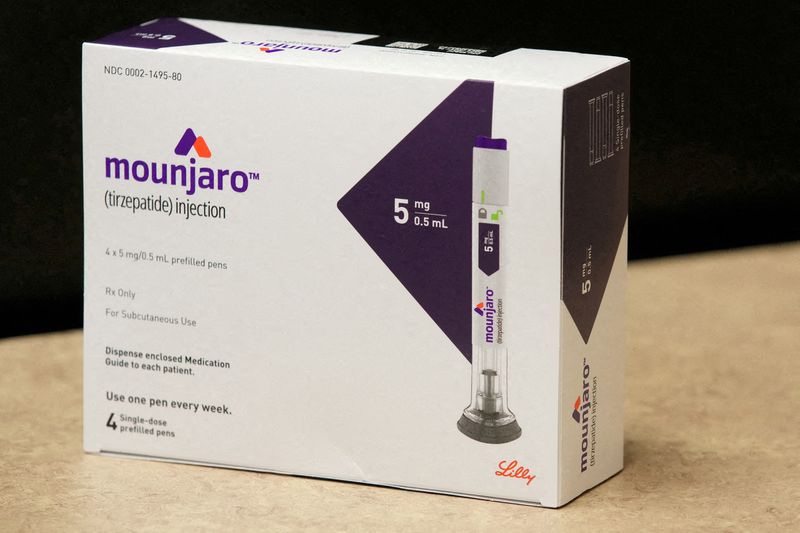By Rishika Sadam and Leroy Leo
HYDERABAD (Reuters) -U.S. drugmaker Eli Lilly (NYSE:LLY) expects to launch Mounjaro, its blockbuster diabetes drug and wildly popular obesity treatment, in India as early as next year after it clears an ongoing regulatory review, CEO David Ricks told Reuters on Wednesday.
The market opportunity is huge in the world's most populous country, which has high obesity rates, especially among women, and the second-highest number of people with type-2 diabetes globally. Indian drugmakers are testing their own versions of weight-loss drugs, while illegal versions are also sold online.
"Our famous Mounjaro – it's under review now. So, perhaps as early as next year to the Indian market," Ricks told Reuters on the sidelines of the BioAsia conference in the southern state of Telangana.
When asked about potentially partnering with others to bring the drug to the market, Ricks said the U.S. drugmaker was "open to any way to reach more patients as long as it makes sense for the company and we can supply the market."
Mounjaro, chemically known as tirzepatide, is currently sold in the UK and Europe under the same brand name for both conditions. However, it is sold under the brand name Zepbound for weight loss in the U.S.
Mounjaro is being reviewed by Indian drug regulators, for which Lilly is using data from its global trials, which included some Indian participants, a company source said, declining to be named as they are not authorized to speak to the media.
Lilly's Mounjaro and Zepbound as well as Danish rival Novo Nordisk (NYSE:NVO)'s in-demand Wegovy and Ozempic are therapies known as GLP-1 receptor agonists, developed to control blood sugar in patients with type 2 diabetes.
But they also slow digestion, helping patients feel full longer, which has led to an explosion in their popularity and left Lilly and Novo Nordisk struggling to keep up with demand.
The global market for these treatments is expected to reach at least $100 billion by the end of the decade, analysts estimate.
Last year, a top Novo Nordisk official told Reuters the Danish company was aiming to bring Wegovy to India in 2026.
Indian drugmakers, which are among the world's largest generic drug makers, are already developing their own versions of Wegovy.
These companies include Zydus Lifesciences, Sun Pharma, Cipla, Dr Reddy's and Lupin.
Of them, Lupin and Cipla are Lilly's Indian distributors, including for some of its older diabetes treatments such as Eglucent, Aplevant, Basaglar and Trulicity.
REGULATORY RIGMAROLE
India should boost patent protection, get rid of redundant policies and create a social safety net to win more investment from global drugmakers, Ricks said in his keynote address at the BioAsia conference.
These steps, he said, would help drive "broader interests for multinationals and foreign direct investment" in India's pharmaceutical industry.

"India has many specific policies related to its regulatory environment all set up for good reason. But in hindsight, perhaps we can reflect upon them and find redundant policies that only cause delay and extra cost."
Ricks said these regulatory challenges had the "two-way effect" of making it tough for companies like Lilly to bring new medicines into the market and constraining local biotechs to export their inventions.